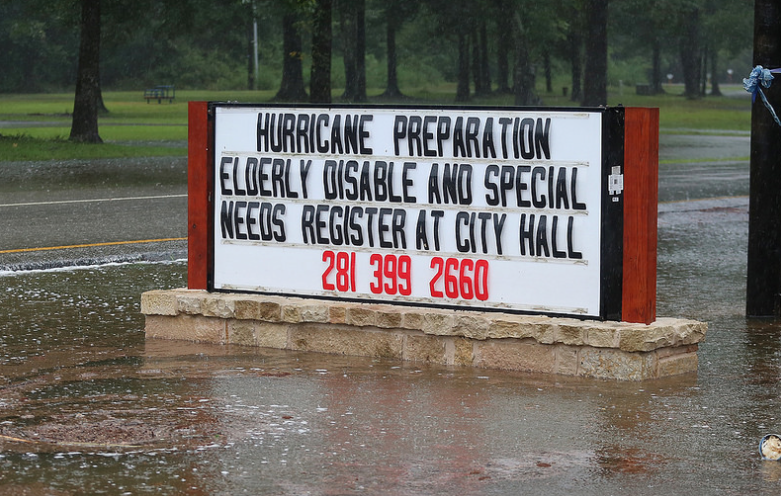As community groups canvass neighborhoods door to door to determine what actually happened when Harvey's record-breaking rain fell across the region, newly available data from the Federal Emergency Management Agency reveals where some of the highest impacts were recorded, capturing everything from home and car damage to food and shelter needs.
The numbers come from completed, valid applications for individual disaster assistance, aggregated by zip code. Four zip codes had more than 8,000 applications each, with the zip code that covers the neighborhoods northwest of the Addicks Reservoir, 77084, completing the highest number of individual assistance applications submitted to FEMA in Harris County with 12,538.
The second most completed applications came from the 77089 by Pearland with 8,928. Northeast Houston's 77044 zip code completed the third highest number of individual assistance applications in the county with 8,204, followed by the 77090 zip code covering Cypress Station, which filed 8,031 applications.
All told, there were a total of more than 436,000 completed, valid applications for individual assistance across Harris County. More than 78 zip codes, roughly 57 percent of all zip codes in the county, submitted more than 2,500 completed applications, showing the reach of the storm. The familiar arrow-shaped geography on the west side of Houston emerges in this map as well. The geography, which covers Montrose, River Oaks and Memorial, is among the wealthiest and whitest corridor in the county.
Notably, the tail area of the arrow, covering the neighborhoods to the east of Barker Reservoir, is a darker blue on this map, presumably since many of the homes there were flooded when officials decided to release water from the dams into surrounding neighborhoods rather than further downstream. Homeowners have filed several lawsuits against the city, Harris County Flood Control District and U.S. Army Corps of Engineers for what they say amounts to an illegal taking.
"I’ve never seen so many lawsuits flying around," Phil Bedient, director of the Severe Storm Prediction, Education, and Evacuation from Disasters center at Rice University, told the Urban Edge. "I honestly truly think this time it’s starting to impact especially first-timers and multimillion dollar houses."
And while that's garnered attention and perhaps helped apply pressure to officials, Harvey also hit long-underserved and vulnerable neighborhoods hard as well. The zip code around Cypress Station, for example, also recorded the highest number of eviction judgments in county courts between May 2016 and May 2017 with some 4,500 cases.
And in Kashmere Gardens, a majority-black neighborhood where residents worry about being overlooked, residents completed more than 6,000 applications for individual disaster assistance. Super Neighborhood President Keith Downey said it's been a challenge helping his neighborhood connect resources and fill out applications. "People traditionally just didn’t know who to contact," Downey told the Urban Edge. "At each meeting I have I say, 'Take two of everything, one for you and one for your neighbor. Tell people what you’re learning.'"
"A lot of us don’t have internet, a lot of us don’t have wifi and a lot of us don’t have fax machines. We’re 0 for 3. So word of mouth, that makes a connection and builds a relationship," said Downey. "It takes time."
And even in neighborhoods where there was less immediate impact, like Fifth Ward just south of Kashmere Gardens, decades of neglect have created layers of challenges for residents. "Each time these storms take a little bit out," said Kathy Flanagan Payton, head of the Fifth Ward Community Redevelopment Corporation, in an interview with the Urban Edge. "While they may not have taken on water they were threatened by loss of income, loss of mobility, all of those things were concerning for us as we talked about moving forward: what impact will this have on us long-term?" Indeed, Fifth Ward residents submitted roughly 3,400 applications for individual disaster assistance, according to the FEMA data.
The applications are for homeowners, renters and business owners who sustained damage to their homes, vehicles, personal property, businesses or inventory as a result of a federally declared disaster may apply for disaster assistance.
Disaster assistance may include grants to help pay for temporary housing, emergency home repairs, uninsured and underinsured personal property losses, and medical, dental and funeral expenses caused by the disaster, along with other serious disaster-related expenses. Though the intake form records food need, FEMA does not provide assistance for food and instead directs people to volunteer organizations, according to its website.
In order to be a valid registration the applicant must be in an Individual Assistance declared state and county and have registered within the FEMA designated registration period. Notably the individual assistance application numbers from FEMA won't include people who are ineligible for assistance, including people without a Social Security number, like undocumented immigrants. Undocumented immigrants who have a child, however, who is a citizen with a social security number can apply on their child's behalf. The numbers also fail to capture need from individuals who were unable to complete the application properly, something community organizers said they've seen residents struggle with.
In order to be approved, applicants also face the challenge of proving that damages were specifically caused by that storm, a burden of proof that is often a challenge for residents in low-income communities with lower quality housing stock to meet.
"We have some renters being denied because landlords need to apply," explained Payton. "They’re pushed to the Small Business Administration. It gets pushed back to FEMA and then it’s over and done. Similar things are happening with my homeowners because of a lack of clarity and technical savvy in terms of completing applications."

